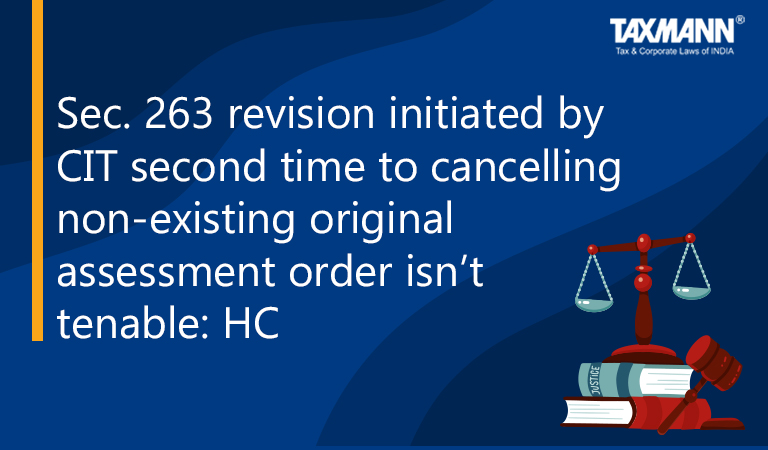Sec. 263 revision initiated by CIT second time to cancelling non-existing original assessment order isn’t tenable: HC
- Blog|News|Income Tax|
- 2 Min Read
- By Taxmann
- |
- Last Updated on 30 November, 2022

Case Details: PCIT v. Padma Kumar Jain - [2022] 145 taxmann.com 113 (Jharkhand)
Judiciary and Counsel Details
-
- Aparesh Kumar Singh & Deepak Roshan, JJ.
- Ms Amrita Sinha, Adv. for the Appellant.
- Biren Poddar, Sr. Adv. for the Respondent.
Facts of the Case
A search and seizure operation was conducted by the Assessing Officer (AO) in the business and residential premises of the assessee-individual. After completion of the search and seizure, a notice under section 153A was issued to which the assessee filed a return of income and an assessment order was passed.
Subsequently, the Principal Commissioner of Income-tax (PCIT) under section 263 directed AO to pass a fresh order cancelling the 1st assessment order. The AO passed the second assessment order under section 143(3) read with section 263.
Later, section 263 proceedings were again initiated for the second time by cancelling the first mentioned assessment order. The assessee objected to the initiation of third assessment proceedings and requested to drop the proceedings.
On appeal, the Rachi Tribunal has quashed the second revisional proceedings. The matter then reached the Jharkhand High Court.
High Court Held
The High Court held that there is no bar under section 263 to initiate two proceedings of the same assessment year if the same is within the time limit prescribed. However, the PCIT has no jurisdiction to cancel the already cancelled first assessment order.
The first assessment order was already cancelled by CIT during the first round of 263 proceedings. Thus the valid assessment order in the instant case would be the second assessment order passed by AO.
The PCIT exercised its jurisdiction for the second time to examine the expenses (loss and damage expenses of Rs. 4 crores) without cancelling the second assessment order. Further, the issues were also already examined by the AO in the original assessment and subsequently by PCIT in the second assessment. PCIT while invoking section 263 for the second time is providing another opportunity to the AO when the entire books of accounts were already furnished by the assessee to the AO.
Therefore, directing made to AO for the 3rd time to scrutinize the books of accounts is not permitted by law. Hence, the directions made by PCIT are erroneous.
List of Cases Reviewed
-
- Padma Kumar Jain v. Pr. CIT [IT Appeal No. 289 (Ran) of 2019, dated 8-7-2022 (para 9) affirmed.
List of Cases Referred to
-
- Union of India v. Susaka (P.) Ltd. [2018] 2 SCC 182 (para 3).
Disclaimer: The content/information published on the website is only for general information of the user and shall not be construed as legal advice. While the Taxmann has exercised reasonable efforts to ensure the veracity of information/content published, Taxmann shall be under no liability in any manner whatsoever for incorrect information, if any.

Taxmann Publications has a dedicated in-house Research & Editorial Team. This team consists of a team of Chartered Accountants, Company Secretaries, and Lawyers. This team works under the guidance and supervision of editor-in-chief Mr Rakesh Bhargava.
The Research and Editorial Team is responsible for developing reliable and accurate content for the readers. The team follows the six-sigma approach to achieve the benchmark of zero error in its publications and research platforms. The team ensures that the following publication guidelines are thoroughly followed while developing the content:
- The statutory material is obtained only from the authorized and reliable sources
- All the latest developments in the judicial and legislative fields are covered
- Prepare the analytical write-ups on current, controversial, and important issues to help the readers to understand the concept and its implications
- Every content published by Taxmann is complete, accurate and lucid
- All evidence-based statements are supported with proper reference to Section, Circular No., Notification No. or citations
- The golden rules of grammar, style and consistency are thoroughly followed
- Font and size that’s easy to read and remain consistent across all imprint and digital publications are applied



 CA | CS | CMA
CA | CS | CMA
